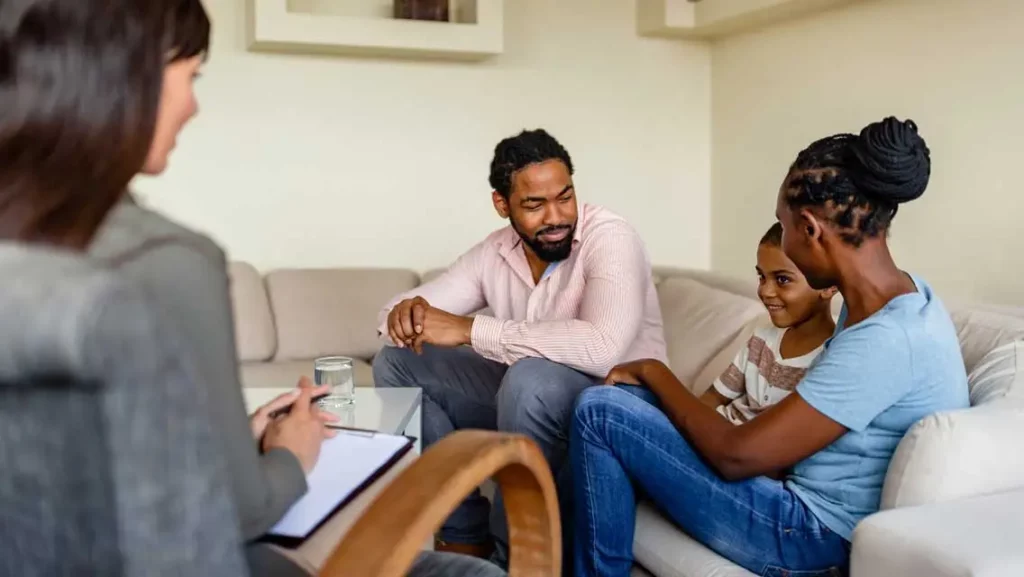Ever feel like family life is a puzzle missing a few pieces? Like the bonds that should be strong sometimes feel strained or tangled? You’re not alone. We get it; family dynamics can be a rollercoaster of emotions, from joy to frustration. But guess what? This blog is your compass through the twists and turns of family dynamics. Ever wondered how to untangle those knots, build better connections, and bring more harmony to your home? Well, you’re in for a treat because we’re diving into the magic that a Licensed Family Therapist can bring to your family life.
Get ready to explore the expert strategies, tips, and insights that can transform the way your family interacts. Let’s go!
Contents
- 1 What Aspects Does a Licensed Family Therapist Specialize In?
- 2 What is the Role of a Family Therapist?
- 3 What Techniques Does a Family Therapist Use?
- 3.1 Systemic Therapy
- 3.2 Strategic Therapy
- 3.3 Narrative Therapy
- 3.4 Cognitive-Behavioral Therapy (CBT)
- 3.5 Structural Therapy
- 3.6 Solution-Focused Brief Therapy (SFBT)
- 3.7 Emotionally Focused Therapy (EFT)
- 3.8 Play Therapy
- 3.9 Communication Skills Training
- 3.10 Genogram Construction
- 3.11 Mindfulness Techniques
- 4 Here’s What You Need To Do To Become a Licensed Family Therapist
- 5 Conclusion
What Aspects Does a Licensed Family Therapist Specialize In?
 Unlocking the expertise of a Licensed Family Therapist (LFT) involves delving into various emotional and behavioral challenges within relationships. LFTs often specialize in distinct areas to offer targeted support. Here are key aspects these professionals may specialize in:
Unlocking the expertise of a Licensed Family Therapist (LFT) involves delving into various emotional and behavioral challenges within relationships. LFTs often specialize in distinct areas to offer targeted support. Here are key aspects these professionals may specialize in:
- Navigating Grief and Trauma
LFTs specialize in helping individuals and families navigate the complexities of grief and trauma. Their expertise aids in processing emotions and fostering resilience during challenging times. - Addressing Depression and Anxiety
Specializing in mental health, LFTs provide guidance in addressing and managing depression and anxiety within the context of family relationships. - Guiding Through Divorce
LFTs specialize in supporting individuals and families through the emotional intricacies of divorce, offering guidance on coping strategies and rebuilding. - Facilitating Co-Parenting
For those facing the challenges of co-parenting post-divorce, LFTs specialize in creating strategies for effective communication and collaboration in the best interest of the children. - Managing Substance Abuse Issues
LFTs with a specialization in substance abuse help families navigate the impact of addiction. They provide support, education, and strategies for recovery. - Navigating the Aftermath of Infidelity
Specializing in relationship dynamics, LFTs assist couples in navigating the aftermath of infidelity, fostering understanding and rebuilding trust. - Addressing Sexual Orientation Issues
LFTs with a focus on sexual orientation provide a safe space for individuals and families to explore and navigate issues related to sexual identity and acceptance. - Facilitating Effective Anger Management
Specializing in anger management, LFTs help individuals and families understand and navigate the emotions underlying anger, fostering healthier ways of expression.
If you have a specific area of interest, seeking an LFT with expertise in that domain can be beneficial. Accredited MFT programs often offer specialized tracks, allowing therapists to hone their skills in addressing specific challenges within the realm of marriage and family therapy.
What is the Role of a Family Therapist?

Curious about the guiding force behind transforming family dynamics? Let’s uncover the crucial role a family therapist plays in reshaping the narrative of your family life:
- Navigating Complexities: A family therapist is your expert navigator through the complexities of family dynamics. They guide you through the twists and turns, helping you understand and address the root causes of challenges.
- Creating a Safe Space: One of the primary roles is to create a safe and judgment-free space. Here, family members can express themselves openly, fostering an environment where honest conversations can take place.
- Encouraging Healthy Communication: Family therapists are communication architects. They teach and encourage healthy communication patterns, ensuring that every family member feels heard and understood.
- Identifying Patterns and Dynamics: Through keen observation, family therapists identify recurring patterns and dynamics within the family. Recognizing these patterns is key to understanding and modifying behaviors for positive change.
- Conflict Resolution Specialist: Family therapists are skilled in the art of conflict resolution. They provide tools and strategies to navigate disagreements, turning conflicts into opportunities for growth and understanding.
- Navigating Generational Shifts: Family therapists navigate the unique challenges posed by generational dynamics. They assist in bridging the gap between different age groups, promoting understanding and harmony.
- Setting Goals for Positive Change: Collaboratively, family therapists work with you to set achievable goals for positive change. These goals become the foundation for a healthier and more fulfilling family life.
- Building Resilience: Family therapists contribute to building resilience within the family unit. They equip you with the tools needed to weather challenges and emerge stronger, fostering a sense of collective strength.
Unveil the multifaceted role of a family therapist as we explore how their expertise becomes the cornerstone of positive change in your family dynamics.
What Techniques Does a Family Therapist Use?

Unraveling the complexities of family dynamics requires a versatile toolkit. Licensed Family Therapists (LFTs) employ a range of techniques to guide families toward healthier relationships. Here are some key therapeutic approaches:
Systemic Therapy
LFTs view families as systems, exploring how each member contributes to the overall dynamic. This approach helps identify patterns and interactions influencing family behavior.
Strategic Therapy
In strategic therapy, the focus is on addressing specific issues or behaviors within a limited timeframe. LFTs use strategic interventions to bring about positive change quickly.
Narrative Therapy
Narrative therapy involves exploring and reshaping the stories families tell about themselves. LFTs help families reconstruct narratives to foster a more positive and empowering outlook.
Cognitive-Behavioral Therapy (CBT)
LFTs may integrate CBT to address negative thought patterns and behaviors within the family. This approach promotes healthier communication and coping strategies.
Structural Therapy
Structural therapy focuses on the family structure, examining roles and hierarchies. LFTs may intervene to realign these structures for a more balanced dynamic.
Solution-Focused Brief Therapy (SFBT)
SFBT concentrates on finding solutions rather than dwelling on problems. LFTs help families identify strengths and build on them to achieve positive outcomes.
Emotionally Focused Therapy (EFT)
EFT emphasizes the emotional bonds within a family. LFTs guide families in understanding and expressing emotions, fostering deeper connections.
Play Therapy
For families with children, play therapy can be a powerful tool. LFTs use play as a medium for expression, allowing children to communicate their feelings in a safe environment.
Communication Skills Training
Improving communication is often a focal point. LFTs teach families effective communication skills, enhancing understanding and reducing conflicts.
Genogram Construction
LFTs may create genograms, visual representations of family relationships, to identify patterns across generations. This tool aids in understanding family history and dynamics.
Mindfulness Techniques
Mindfulness practices help families stay present and manage stress. LFTs may introduce mindfulness exercises to enhance emotional regulation and self-awareness.
Understanding these techniques provides insight into the adaptable and holistic approach that LFTs bring to family therapy. Each method serves as a unique tool in fostering positive change and promoting healthier relationships within the family unit.
Here’s What You Need To Do To Become a Licensed Family Therapist
 Embarking on the journey to become a Licensed Family Therapist involves a carefully navigated path. If you’re passionate about helping families thrive, here’s your roadmap to entering this rewarding profession:
Embarking on the journey to become a Licensed Family Therapist involves a carefully navigated path. If you’re passionate about helping families thrive, here’s your roadmap to entering this rewarding profession:
- Pursue a Master’s Degree:
Enroll in a Master’s program in Marriage and Family Therapy (MFT) from an accredited institution. This specialized education delves into the intricacies of family dynamics, therapeutic techniques, and ethical practices. - Complete Supervised Clinical Experience:
Most licensing boards require a certain number of supervised clinical hours. Work under the guidance of a licensed therapist to gain hands-on experience and refine your therapeutic skills. - Pass the National Exam:
Many licensing boards require candidates to pass the national examination for Marriage and Family Therapists. Prepare thoroughly for this exam, which assesses your knowledge of core concepts and ethical standards. - Accrue Postgraduate Clinical Hours:
After completing your master’s degree, continue accruing postgraduate clinical hours under supervision. This period is crucial for honing your skills and applying theoretical knowledge to actual client cases. - Apply for State Licensure:
Research the specific licensure requirements in your state. Submit your application for licensure along with all necessary documentation, including transcripts, clinical hours, and examination results. - Adhere to Ethical Standards:
Uphold the ethical standards and guidelines set by the licensing board. Maintain the highest level of professionalism, confidentiality, and respect for clients. - Seek Supervision and Mentorship:
Throughout your career, seek supervision and mentorship from experienced family therapists. This ongoing support contributes to your professional growth and effectiveness as a therapist.
Remember, the journey to becoming a Licensed Family Therapist is both challenging and rewarding. By diligently following these steps, you’ll be well-equipped to make a positive impact on the lives of individuals and families through the transformative power of therapy.
Conclusion
In today’s fast-paced world, the role of online therapists has become indispensable. Their virtual presence offers a convenient and accessible avenue for individuals seeking mental health support and treatment. The importance of this accessibility cannot be overstated, especially when facing the challenges of daily life.
As the stigma surrounding mental health continues to fade, embracing the ease of online therapy is a proactive step towards prioritizing your well-being. At TherapyMantra, we understand the value of affordable and accessible mental health care. Take the first step towards a healthier you by booking a trial online therapy session. Your journey to mental wellness begins here. Don’t hesitate – invest in yourself today.


